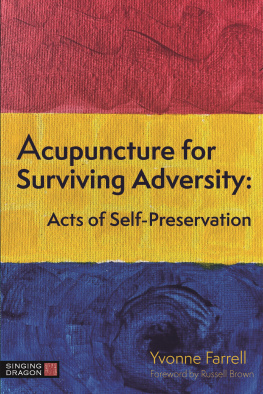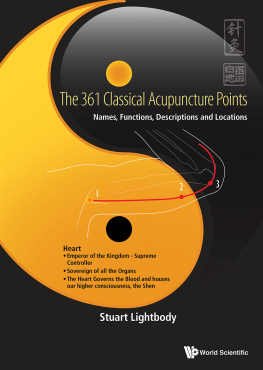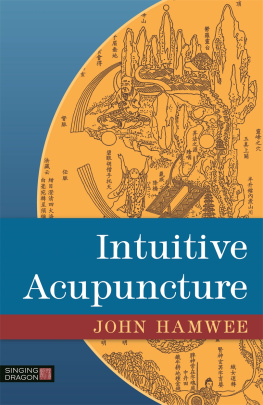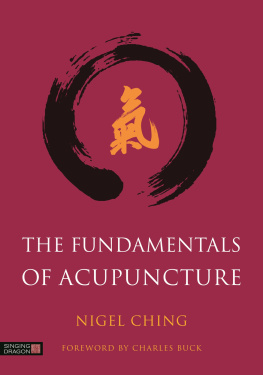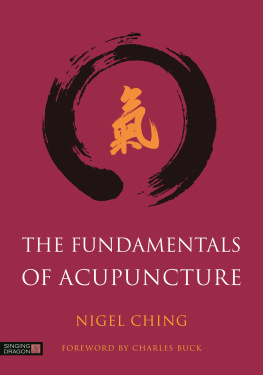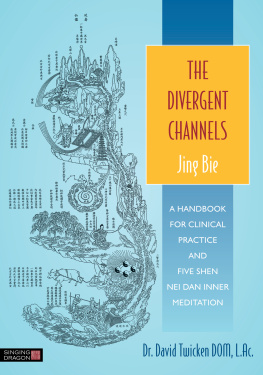Contents

ACUPUNCTURE
for SURVIVING
ADVERSITY
Acts of Self-Preservation
YVONNE R. FARRELL
Foreword by Russell Brown, L.Ac.

Contents
Foreword
I cant fall asleep.
Im restless. Gripped by a young and unnecessarily rousing anxiety about some patient, or Ghost Point, or any of an assortment of existential crises. I hold out for as long as I can before I inevitably break, and fire off another dramatically urgent-neurotic email to Doc Farrell, begging for clarity and sedation.
This is how every email I sent to Dr. Yvonne Farrell happened in the eager but terrifying early days of my clinical practice. (Well, a lot of them.)
I had the great fortune of being the eager but terrified student of Dr. Farrell almost twenty years ago. Over these twenty years, Yvonne and I have become colleaguesand friendsand I credit her work with being the foundation of my practice. Her mastery of the complete meridian systemintegrating both the Primary and the Secondary Vesselsgave me new eyes. I see the world differently because of her instruction; I see myself differently.
It is only in retrospect that I realize that every question I ever asked in these twenty yearsevery panicked text in the middle of the nightwas always a variation on the same question: How do you survive adversity? How do you outpace the seemingly relentless, insurmountable, painful struggles that come with being alive? How do you move forward, and why?
I like to think that when she sat down to write this book, she was writing it just for me, to answer my question, definitively.
This book is primarily about the Secondary Vessels, a subject most acupuncture schools treat like Harry Potter is treated by his Muggle familycrammed into a bedroom under the staircase and told to shhh at fancy dinners. And although there are other books written about them, it is only Dr. Farrells comprehensive assessment, rendered with practical and personal detail, that definitively pulls them out from under the stairs and declares them neither extraneous nor also-ran.
Dr. Farrell identifies the Secondary Vessels as the essential cornerstone for how we survive trauma; they are critical to how our bodies metabolize, store and move pain so that we may continue to live. But like her last book on the Extraordinary Vesselswhich I describe as a memoir hidden within a textbookthis one is also a Trojan Horse: Within its meridian cartography is an unflinching and cathartic meditation on how we rise to meet the inevitability of suffering.
This book is about how our bodies, minds and spirits cope with the crucible of evolutionary stress without becoming lost in pain or going extinct. It is about the grand gift the natural world bestowed on us: a stubborn and awesome predisposition for self-preservation. Which is why I feel it has less in common with a volume of Giovanni Maciocia and more with Charles Darwins On the Origin of Species ; or spectacular National Geographic reporting on how stars are born, burn for millennia and are then swallowed up whole; or how dinosaurs lived and died.
Yvonnes book is the story of how the things that last, lasted. The beating heart of her writing is survival and the cost of survival: how living things endure dark days and inclement weather .
I hope you are brave enough to digest these lessons through the lens of how you survive your own dark days and inclement weather, which we are all doing, even now, even as we hide out reading this book, I hope in some warm corner of Earth. The world itself is holding its breath in survival these days. This is the story of how you survived, too. It doesnt even matter if you never treat another patient again.
I remember receiving her responses on the mornings after those panicked midnight messages. They were usually just a few taut wordstough, loving, wise onesalways a variation on the same, simple reminder: The bad weather is a lesson. The adversary is the curriculum. You will survive this, too. Survival isnt accidental. Its built into your biology. Trust this. Life loves you.
Then she would add, plainly poking fun at my up-all-night neuroses: What a fabulous opportunity for you! That is Yvonne Farrell. And she was right. She almost always is.
And now we all have this book.
What a fabulous opportunity for us.
Russell Brown, L.Ac .
Summer 2020
INTRODUCTION
Gratitude and Survival
W e are more than the sum of our body parts. We are the sum of those parts plus every experience we have. We are living, breathing, dynamic systems that express themselves physically, emotionally, mentally and spiritually. We are the recipients of the bounty and the baggage of previous generations. We live in the shadow or light of the families and cultures in which we are raised and we are all connected.
We have the capacity to survive through countless acts of self-preservation. Beyond survival, we are blessed to have in us the ability to learn and grow from most every challenge we encounter in life. When we have alignment in our constitution and temperament, and our resources are plenty, we are ensured the building blocks needed for us to thrive in a life of meaning and purpose. We are able, with attention and intention, to become more of who we are. We can illuminate and embrace the lost or hidden parts of ourselves so that we might become a more authentic expression of that Self. Every movement we make towards consciousness makes us more human, and it is the depth of that humanity that will support us in fulfilling our purpose in this life.
As Carl Jung said, The reason why consciousness exists, and why there is an urge to widen and deepen it, is very simple: without consciousness things go less well (1975, para. 695).
I am a big fan of Pema Chdrn. I especially like her teaching around the quality of Maitr. Maitr means benevolence, loving-kindness, friendliness, amity, goodwill and active interest in others. It is the first of the four sublime states and one of the ten prams of the Theravda school of Buddhism. Maitr is the practice of developing an unconditional friendship with yourself. It is the gift of self-acceptance. To move beyond survival into a state of thriving, it may be essential to develop a more friendly and compassionate relationship with yourself. I am not talking about cutting yourself slack when you dont feel like doing what needs to be done. I am also not talking about having lower expectations of yourself. I am advocating for us all to be as kind to ourselves as we are to someone else who is clearly suffering. When you are struggling with life, do you have compassion for yourself or do you hear all of those critical voices from the past, judging you harshly for your choices and actions?
With practice and intent, we can accept our current struggles and recognize that the choices and actions we have made to get to this point were, by and large, unconscious acts of self-preservation. We do what we must to get through lifes challenges and stresses, but mostly we do that without thinking it through or even realizing the potential cost of the decisions we make. When we do think it through beforehand, those thoughts are typically formed by unconscious biases and habituated or indoctrinated beliefs. If we were told often enough that we are unworthy, we will believe we deserve what is happening to us, and our thoughts and behavior will align with those beliefs. We typically do whatever we believe will get us through what we are facing in the moment.

